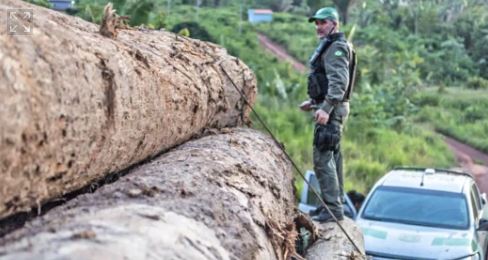
Environmental agents are analysing satellite imagery and
conducting on-site inspections to identify the flow of illegal
timber.
Photo: IBAMA via Wikimedia Commons
Brazilian environmental agents seized the equivalent of more
than 5,000 truckloads of timber in an operation targeting one of
the most heavily logged regions of the Amazon rainforest in
recent weeks.
The raids kicked off a year-long project called Operation
Maravalha, named after a type of sawdust, in the states of
Amazonas, Para and Rondonia. The government expects Maravalha to
be the largest operation of its kind in over five years.
Environmental protection agency Ibama, which led the operation,
closed nearly a dozen sawmills and levied fines totaling 15.5
million reais ($2.7 million) during a two-week raid.
The operation¡¯s goal is to curb illegal logging in protected
areas and Indigenous lands with some of the country¡¯s highest
deforestation rates, said Jair Schmitt, head of environmental
protection at Ibama.
Investigators are also auditing timber projects in private lands
suspected of defrauding government documentation to hide the
real origin of native timber obtained illegally, Schmitt added.
After the raids, Ibama plans to suspend some of the timber
projects that were illegally used to launder timber taken from
protected areas, Schmitt said.
¡°The idea behind this operation is for us to contain the
extraction of illegal timber in the Amazon, which is the first
step to deforestation,¡± said Schmitt, as he stood near a pile of
illegal timber his team seized in a rural part of Rondonia¡¯s
capital, Porto Velho.
After valuable timber is extracted, Schmitt said, the rest of
the forest is often razed to make way for cattle pasture.
Profits made from the sale of timber are often used to fund the
expensive process of converting the lush forest into pastures.
While roughly 90% of the timber illegally harvested in Brazil¡¯s
Amazon rainforest is sold locally, some still reaches the United
States and Europe, Schmitt said.
Investigators in the raid in Porto Velho found wood from several
Amazon species considered valuable in global markets, such as
the ipe, which is also endangered. The timber seized by Ibama
will be donated to government agencies and projects.
Source:
Reuters